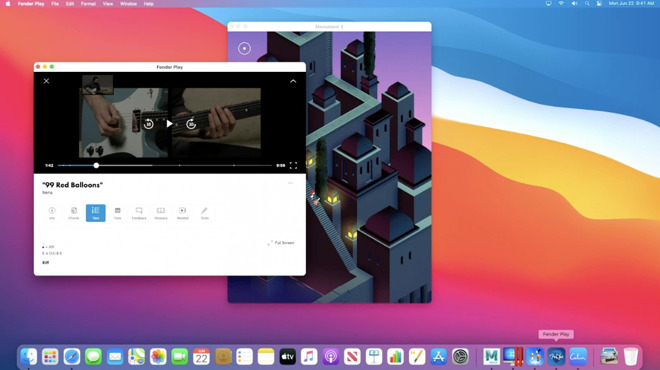Beyond Rosetta 2 for Intel apps, 'Apple Silicon' Macs will run iPhone, iPad apps natively
Apple isn't just allowing for Intel apps to run after a modification at install, but additionally, Apple's shift to its own proprietary silicon will allow Macs to run iOS and iPadOS apps natively.

Credit: Apple
Because the first of Apple's ARM Mac devices will run Apple Silicon chips, apps that were developed for iPhone or iPad chips will run natively on them -- without the need for developers to recompile code.
During Apple's WWDC 2020 keynote, Apple VP Andreas Wendker showed off iOS apps like Monument Valley, Fender Play and Calm running smoothly on a development Mac running macOS Big Sur. Those apps will be available straight from the Mac App Store.
The native iPhone and iPad apps on Mac are just part of the wide ecosystem of software that ARM Macs will be able to run, Apple said.
Through Rosetta 2, ARM Macs will be able to run programs written for Intel-based Macs. New virtualization software will allow those Macs to run other operating systems like Linux.
The Cupertino tech giant will release the first Mac with custom chips by the end of 2020, while it expects the overall transition to ARM will complete in about two years.

Credit: Apple
Because the first of Apple's ARM Mac devices will run Apple Silicon chips, apps that were developed for iPhone or iPad chips will run natively on them -- without the need for developers to recompile code.
During Apple's WWDC 2020 keynote, Apple VP Andreas Wendker showed off iOS apps like Monument Valley, Fender Play and Calm running smoothly on a development Mac running macOS Big Sur. Those apps will be available straight from the Mac App Store.
The native iPhone and iPad apps on Mac are just part of the wide ecosystem of software that ARM Macs will be able to run, Apple said.
Through Rosetta 2, ARM Macs will be able to run programs written for Intel-based Macs. New virtualization software will allow those Macs to run other operating systems like Linux.
The Cupertino tech giant will release the first Mac with custom chips by the end of 2020, while it expects the overall transition to ARM will complete in about two years.

Comments
Are they meaning that all apps will be native, or that they will have it figured out in two years?
Two years includes breathing space in case of issues. Apple likes to beat their deadlines.
Expect most of the hardware line on "Apple Silicon" by the end of next year. Maybe a Mac Pro or something will remain on Intel for a few more months.
We don’t know that. What we know is that “Apple Silicon“ will be compatible with A-Series SoCs. Apple even mentioned that they developed a “Mac”-series of SoCs.
It basically means they are giving themselves two years to move all their Macs off Intel and onto Apple Silicon. The mini will probably be the first to make the transition, followed by the Mac Book, and then the iMac.
Of course, there's no guarantee the first consumer available ARM Mac will be a mini, it could still be the MBP or the iMac, but if they already have the mini hardware...
Aren't those constant switches wa to kill all the great freeware apps? How many those developers have resources to constantly update apps?
There was one great browser.... it had so wast collection of add-ons I was relying on. But constant changes in code killed all of them. So on Mac I dropped Firefox as having little to no real advantage.